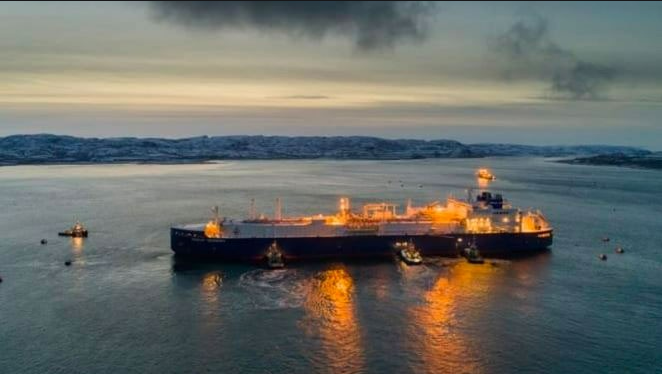Construction starts at new Murmansk LNG hub

War and international sanctions notwithstanding, the Russian natural gas company forges ahead with the development of its grand Arctic projects.
Company owner and CEO Mikhelson this week reiterated that the Arctic LNG 2 is proceeding according to plans and that the first of the project’s three trains will be ready for operations in late 2023.
“We plan to launch production at the first train at the end of the year,” he told news agency Prime.
When fully completed, the Arctic LNG 2 will be Russia’s biggest project of the kind with an annual production of 19,8 million tons of LNG. Mikhelson spoke to the press during the India Energy Week.
The company leader also underlined that the LNG terminal hub in the Ura Bay northwest of Murmansk will be ready this year.
Little is known about the status of the construction project. But ship traffic in the Ura Bay has lately been at a higher level than normal, something that could indicate ongoing project preparations.
A similar reloading terminal is under construction in the far eastern peninsula of Kamchatka.
According to Mikhelson, the two reloading facilities will promote price stabilisation in the market.
“We hope that the presence of permanent volumes of LNG at these sites will lead to price stabilisation in the market: we hope that both futures and speculative hedging in the LNG market will stabilise,” he told news agency Finmarket.
The Ura Bay is today first of all known for its nuclear submarine base. The fjord has deep waters and does not freeze in wintertime.
Floating facilities
The reloading terminal will consist of floating facilities that can hold up to 360,000 tons of LNG each and simultaneously serve two LNG tankers. When ready, ice-class carriers will shuttle between the terminals and LNG plants in the Yamal and Gydan Peninsulas.
The new logistical scheme will cut costs and provide efficient transportation of liquified natural gas from the Arctic LNG 2, as well as other projects in the Arctic, the company argues.
The terminal will have a capacity to handle about 20 million tons per year and are due to be ready for operations in 2023.
In April 2021, French company Total acquired 10 percent of Arkticheskaya Perevalka, the subsidiary company of Novatek that will operate the reloading facility.
The terminal will be built by Korean yard Daewoo Shipbuilding & Marine Engineering (DSME), that in October 2020 signed a $748.2 million contract with the Russian State Transport Leasing Company. According to the deal, the terminal barges will be owned by the State Transport Leasing Company, but operated by Arkticheskaya Perevalka.
The development of the terminal in Ura Bay is considered tricky as the project site is located only few kilometers from closed military town Vidyaevo and a local Northern Fleet submarine base. The project was discussed in a high-level meeting with participation of government ministers, military leaders and company chiefs in August 2018.
The local Navy base today houses several nuclear-powered submarines, including Sierra-II and Victor-III vessels.
Vidyaevo is located about 50 km to the northwest of Murmansk, not far from the border to Norway. It has a deep and year-round ice-free fjord, and is considered among the most favorable spots for shipping and logistics on the Kola Peninsula.
Since Novatek launched the Yamal LNG plant in 2017, ice-class carriers have shipped mainly directly to customers in Europe. In 2019, a temporary ship-to-ship reloading scheme was applied in the north Norwegian Sarnes Fjord, and later near the Kildin Island.
In November 2022, a ship-to-ship reloading operation took place by Kildin.
The Arctic LNG 2 is due to deliver its liquified natural gas both to customers in Europe and Asia. To the latter, Novatek intends to ship along the Northern Sea Route.
Related stories from around the North:
Canada: Community in northern Quebec to make the jump from diesel to hydroelectricity, CBC News
Finland: The world could transition entirely to cheap, safe renewable energy before 2050: Finnish study, Yle News
Norway: Norwegian energy giant Equinor exits Russia, calling Ukraine invasion a “setback for the world,” The Independent Barents Observer
Russia: Russian Arctic LNG advances in European market, The Independent Barents Observer
United States: BLM proposes allowing ConocoPhillips to drill most of its Arctic Willow project, Alaska Public Media



